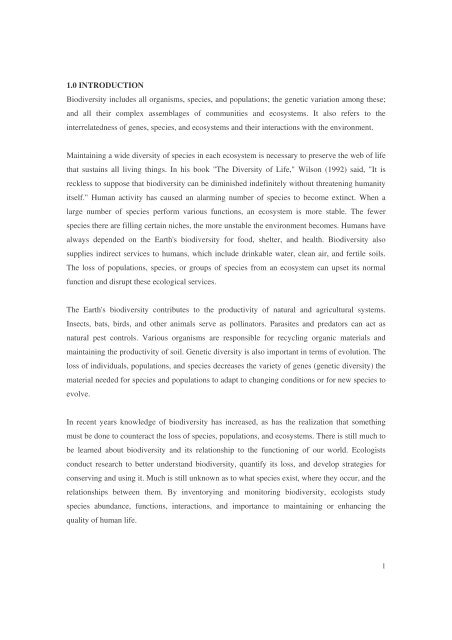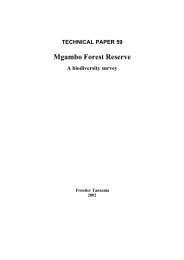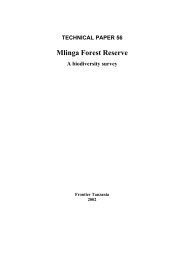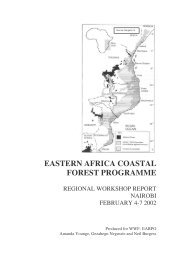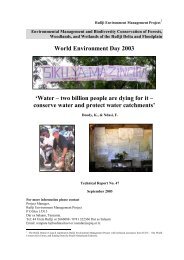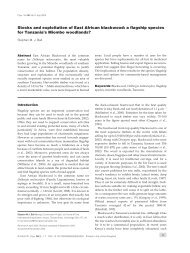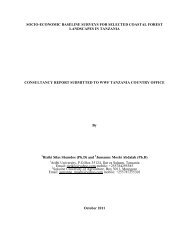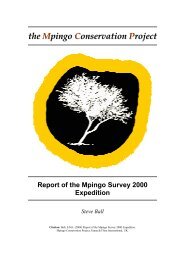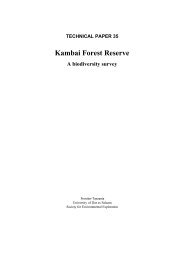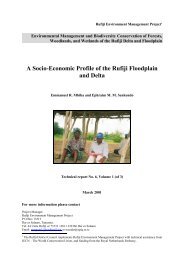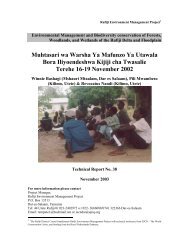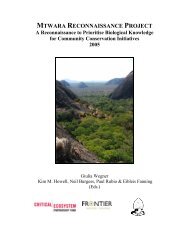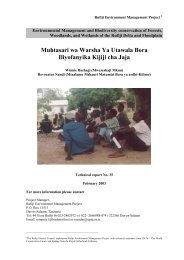Jozani biodiversity inventory report 2002 - Coastal Forests of Kenya ...
Jozani biodiversity inventory report 2002 - Coastal Forests of Kenya ...
Jozani biodiversity inventory report 2002 - Coastal Forests of Kenya ...
You also want an ePaper? Increase the reach of your titles
YUMPU automatically turns print PDFs into web optimized ePapers that Google loves.
1.0 INTRODUCTION<br />
Biodiversity includes all organisms, species, and populations; the genetic variation among these;<br />
and all their complex assemblages <strong>of</strong> communities and ecosystems. It also refers to the<br />
interrelatedness <strong>of</strong> genes, species, and ecosystems and their interactions with the environment.<br />
Maintaining a wide diversity <strong>of</strong> species in each ecosystem is necessary to preserve the web <strong>of</strong> life<br />
that sustains all living things. In his book "The Diversity <strong>of</strong> Life," Wilson (1992) said, "It is<br />
reckless to suppose that <strong>biodiversity</strong> can be diminished indefinitely without threatening humanity<br />
itself." Human activity has caused an alarming number <strong>of</strong> species to become extinct. When a<br />
large number <strong>of</strong> species perform various functions, an ecosystem is more stable. The fewer<br />
species there are filling certain niches, the more unstable the environment becomes. Humans have<br />
always depended on the Earth's <strong>biodiversity</strong> for food, shelter, and health. Biodiversity also<br />
supplies indirect services to humans, which include drinkable water, clean air, and fertile soils.<br />
The loss <strong>of</strong> populations, species, or groups <strong>of</strong> species from an ecosystem can upset its normal<br />
function and disrupt these ecological services.<br />
The Earth's <strong>biodiversity</strong> contributes to the productivity <strong>of</strong> natural and agricultural systems.<br />
Insects, bats, birds, and other animals serve as pollinators. Parasites and predators can act as<br />
natural pest controls. Various organisms are responsible for recycling organic materials and<br />
maintaining the productivity <strong>of</strong> soil. Genetic diversity is also important in terms <strong>of</strong> evolution. The<br />
loss <strong>of</strong> individuals, populations, and species decreases the variety <strong>of</strong> genes (genetic diversity) the<br />
material needed for species and populations to adapt to changing conditions or for new species to<br />
evolve.<br />
In recent years knowledge <strong>of</strong> <strong>biodiversity</strong> has increased, as has the realization that something<br />
must be done to counteract the loss <strong>of</strong> species, populations, and ecosystems. There is still much to<br />
be learned about <strong>biodiversity</strong> and its relationship to the functioning <strong>of</strong> our world. Ecologists<br />
conduct research to better understand <strong>biodiversity</strong>, quantify its loss, and develop strategies for<br />
conserving and using it. Much is still unknown as to what species exist, where they occur, and the<br />
relationships between them. By <strong>inventory</strong>ing and monitoring <strong>biodiversity</strong>, ecologists study<br />
species abundance, functions, interactions, and importance to maintaining or enhancing the<br />
quality <strong>of</strong> human life.<br />
1


